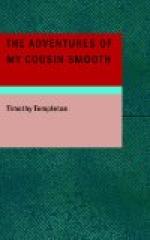CHAPTER XIII.
MR. SMOOTH SEES A COUNTRY GREAT IN RESOURCES BLIGHTED BY A NARROW POLICY.
“Difficult is it for a man travelling in a country where everything seems crooked, to keep up straight ideas. I have said crooked, for where nature has been most profuse in her blessings, and no signs of the iron sinews of progress are seen; where no Mississippi steamboats move on in busy occupation, opening up the resources of a country; where no bright villages hold to light the charms of hardy industry; where the favored few gather the fruits of the husbandman’s energy—something must indeed be crooked. Through countries enamelled of nature’s best offerings, as fine as ever spread out before the eye of man, we travelled; but all seemed wasting away in the inertness of bad government. A narrow policy had spread weeds where fruitful vines would have hung blessings for mankind. Things called men revelled in what to them seemed luxury, but in poverty and wretchedness a people struggled; men walked to and fro in tattered garments, colored like unto their moral and physical degradation. But they heeded it not, and were careless because no one cared for them. There is no slavery so abhorrent as that of the menial who has no thought beyond the narrow sphere of his servitude, and the little pleasure which his light heart may transitorily enjoy. Here men saw no vitality in the hand that ruled: hence they maudled through that deadening scum of servile life that tramples better things beneath its feet.
“From the fertile bottoms of the Himalayas to the Indian ocean on one side, and from the Burmese boundary to wherever British rule extended on the other, there spread out the same sickly prospect. There, resigned, stood outlined the same apathy of spirit, the same result of misgovernment—the same soul-degrading influences; the same rebuking spectacle; the result of the same wealth-dredging principles practiced by a few. Cotton, corn, and sugar, would have repaid the hand of the husbandman tenfold, nature having given it germ for that purpose; but jungle grew in their stead, while bad government rioted in its follies. Nationality had no soul, energy no lifesprings, progress no railroads to move onward. The honorable John, having conquered, and very modestly enthroned himself, was strong to maintain his centralizing power, from which point he would make effectual his blighting policy. Notwithstanding this, John would have us believe him world-wide in his kindness, desire his power made known to mankind in general, and stood ever ready to have his philanthropy and his tears spent upon the sorrows of the American slave. Were they not more needed in his own Indian dominions? A peasant clothed in rags picks his little spot of sickly cotton as it falls from the bowl; but how valueless is it to the poor wretch ignorant of the first principles of trade! Yet, instead of providing for his improvement,




